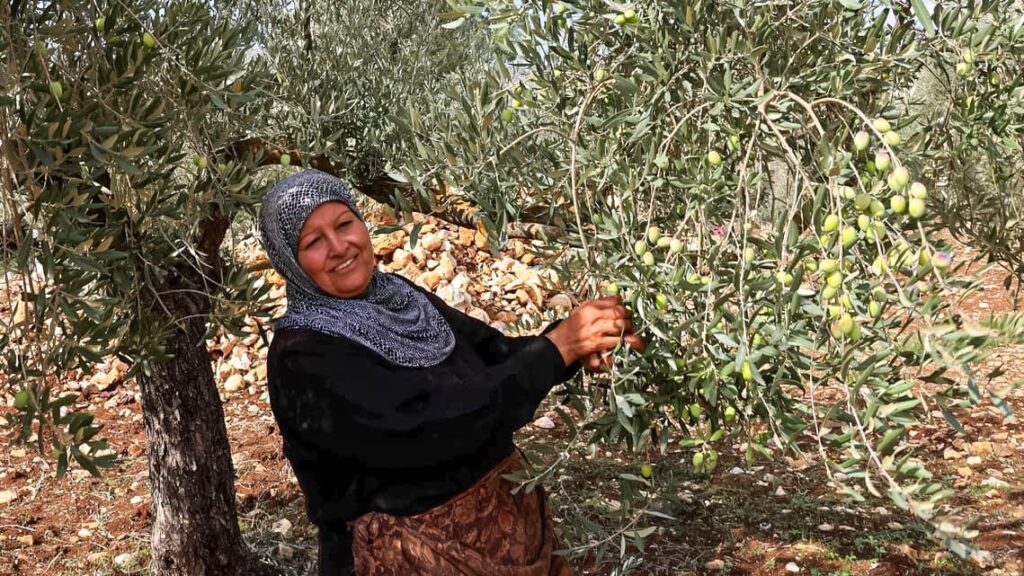In the serene landscapes of Al Balqa, Jordan, Farah, an enterprising agripreneur, cultivates the revered Rumi variety of olives in a one-hectare ancestral plot. The Rumi variety of olives is well known for its high oil content and versatility in pickling and pressing. Olives are a big part of the traditional Jordanian diet, used as cooking oil, salad dressing and food preservative.
In Jordan, olive farming covers a big part of the land where crops grow. About 12 million olive trees take up around 24% of all the land used for farming. These trees make up 74%[i] of the fruit trees in the country.
Farah’s journey into olive farming sprouted from the soil of necessity. After grappling with unemployment for two years despite completing her college studies, she found solace and purpose in the olive groves. Unemployment in Jordan, especially for women, persists at a concerning 12.5%[ii] painting a stark reality that Farah confronted head-on.
Her foray into olive cultivation was made possible by a lifeline extended from her cousin in the USA, a beacon of hope amidst financial uncertainties. In a country where the funding gap for MSMEs stands at a staggering $6.6 billion[iii], Farah’s struggle to secure starting capital from financial institutions mirrors the challenges many aspiring entrepreneurs face.
However, fueled by determination and familial support, Farah’s journey began. She embarked on her olive farming venture eleven years ago, transforming her ancestral land into a sanctuary of thriving olive trees. The income generated from selling olive oil and brined olives at local markets became the sustenance for her family, a testament to her resilience and unwavering spirit. Olive farming is the only source of income for Farah just like the other 80,000[iv] households in Jordan who depend solely on Olive farming for employment and income.
Yet, the path to success was not without hurdles. Farah encountered the stark realities of farming in an era marked by climate change. Irregular production cycles plagued by shifting rainfall patterns and scorching summer heatwaves posed persistent challenges. Moreover, the mismanagement of olive industry by-products added to the woes of farmers like Farah.
In her pursuit of resilience, Farah sought assistance from the MicroFund for Women a program funded by European Bank for Reconstruction and Development (ERBD), a beacon of support for female entrepreneurs. The $2,000 grant she received became a lifeline, invested wisely in additional water tanks crucial for storing water and essential for irrigation, a testament to her dedication to sustaining her olive groves despite adversities.
Amidst these trials, remittances, like the support from her cousin, have proven instrumental in bolstering Jordan’s economy, recording a remarkable $5 billion[v] in 2022. This financial influx from the Jordanian diaspora abroad underscores the significance of familial and communal support for individuals like Farah striving to carve their path in agriculture.Farah’s story epitomizes the spirit of determination, embodying the fusion of tradition, innovation, and perseverance. Her journey as an agripreneur mirrors the resilience of Jordan’s agricultural landscape, where the olive tree stands tall as a symbol of sustenance, tradition, and hope for a brighter future.
[i] https://www.olioofficina.it/en/knowledge/economy/olive-growing-in-jordan.htm#:~:text=characteristics%20and%20tastes.-,Olive%20growing%20is%20spread%20over%20two%20regions%20of%20the%20country,surface%20planted%20with%20fruit%20trees.
[ii] https://www.ilo.org/wcmsp5/groups/public/—ed emp/documents/publication/wcms_622766.pdf
[iii] https://www.smefinanceforum.org/data-sites/msme-finance-gap
[iv] https://www.olioofficina.it/en/knowledge/economy/olive-growing-in-jordan.htm#:~:text=characteristics%20and%20tastes.-,Olive%20growing%20is%20spread%20over%20two%20regions%20of%20the%20country,surface%20planted%20with%20fruit%20trees.
